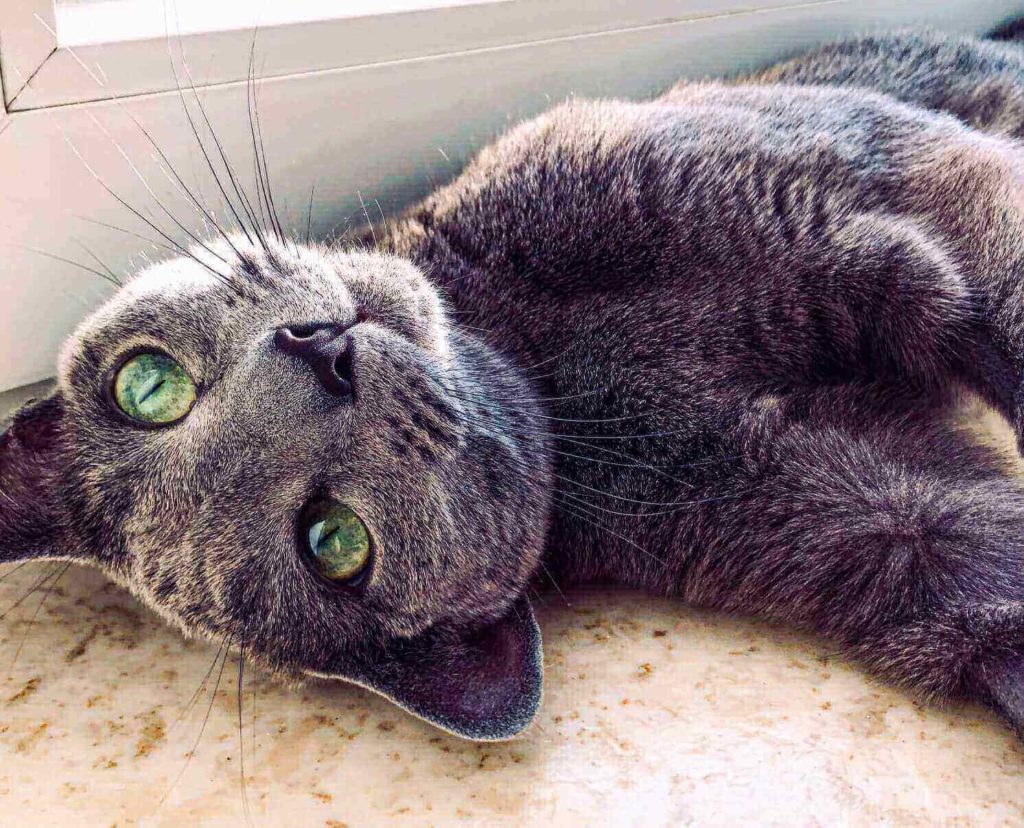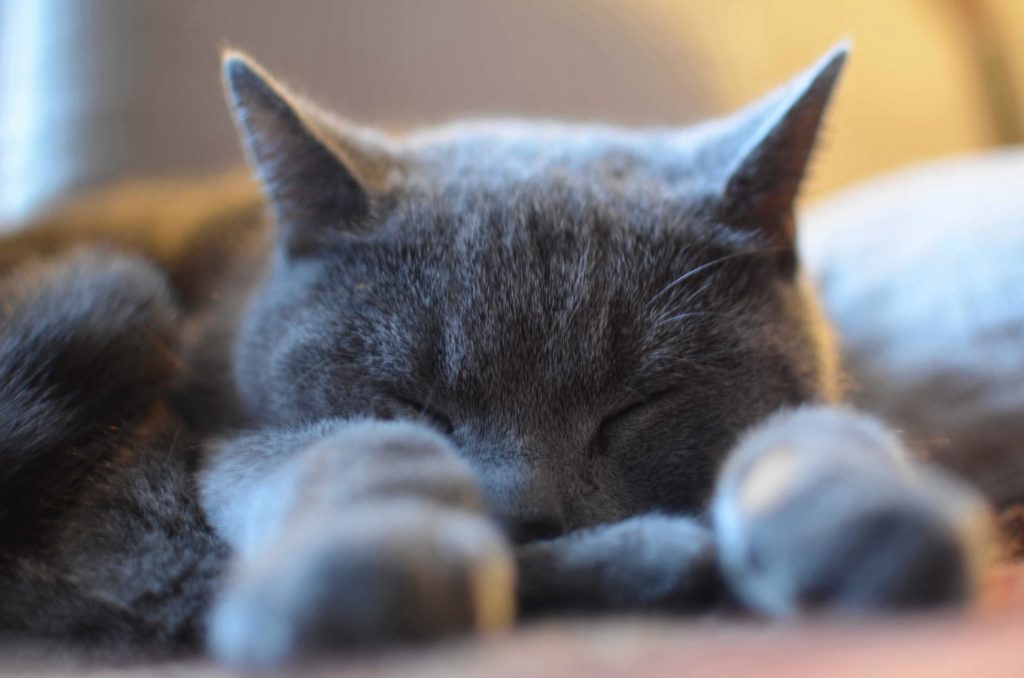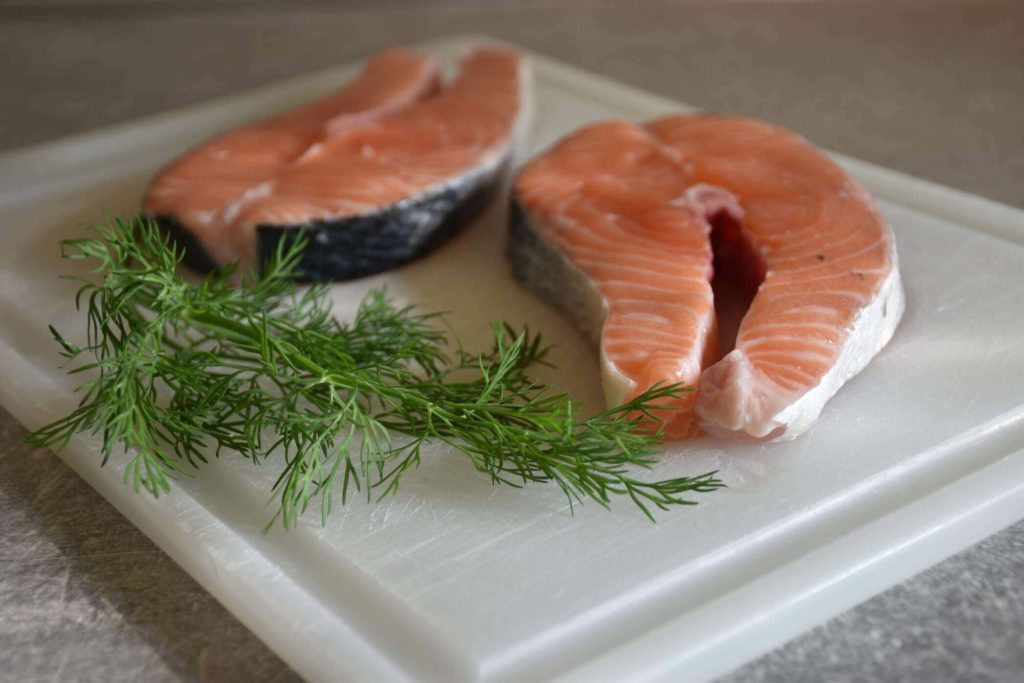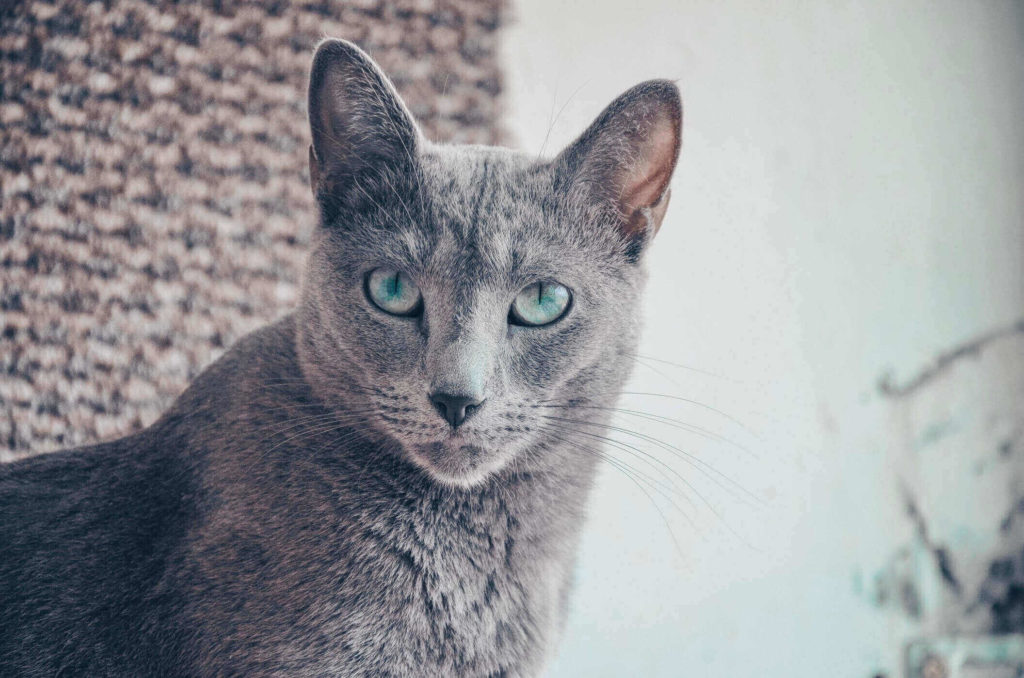Tell me something do you feel like sharing your food with the Russian Blue cat when they stare at you while eating? I predict you will say yes. Many Russian Blue cat owners like to share their foods, mainly liquid foods like coconut and soy milk, with them. But have you ever wondered if Russian Blue cat drink soy/coconut milk? If not, don’t worry!
Starting with the often asked question, ‘Do Russian Blue cat drink soy or coconut milk?’ To respond- Yes, the Russian Blue drinks soy/coconut milk. But in general, by considering their health, you shouldn’t let your Russian Blue cat drink soy/coconut milk. As coconut and soy milk contain sugar, cane syrup, and other sweeteners, it can badly affect the Russian Blue cat’s health.
Hence, to learn more about soy and coconut milk and its effect on the Russian Blue cat, stick to this article till the end. Here, I have summed up every essential detail regarding such liquid drinks that you may have been serving or considering to feed to your Russian Blue cat.
Things To Know About Soy And Coconut Milk
Before getting into the extensive details about the Russian Blue cat’s drinking soy/coconut milk behavior, here is what you should learn. Yes, it is about liquid food: soy milk and coconut milk, respectively.
Soy Milk
Soy milk is plant-based milk, which formulates with the help of dried soybeans or soya beans. As the milk forms by soya beans or soybeans, people call it as soya milk too.
At present, most people do prefer soy milk for a proper diet. It is rich in several necessary nutrients like protein, vitamins, and many more.
Formulation Of Soy Milk
Generally, the soy milk formulation goes through several processes. Starting with the drying of soya beans, grinding the next, boiling, and finally draining out some particles stuck in it. As it gets ready, the milk seems to have less amount of fat with zero levels of cholesterol in it.
It is also one of the main reasons for people preferring it more.
How Long Can Soy Milk Last?
Firstly, learn that soy milk is not a dairy product. But this doesn’t mean that you can leave the milk unrefrigerated or on a shelf after you open it.
Generally, you can get two kinds of soy milk. One is refrigerated soy milk, and another is unrefrigerated soy milk. It is crucial to store it in the refrigerator once you open it. No matter either you have purchased refrigerated or unrefrigerated soy milk, stocking it on a shelf once opened will go out of taste or bad after some days. Therefore, soy milk can last up to 10 days in the refrigerator once you open it. But if you have bought soy milk either refrigerated or unrefrigerated, it can last up to 6 to 8 months if unopened. Still, if in confusion, varieties of available soy milk have marked an expiry date in it. You can check the marked label.
Coconut Milk
I believe many people are quite familiar with the term; coconut. And as it is about coconut milk, the main ingredient here will be a coconut. So, coconut milk is a milky white liquid made with coconut flesh (the white part).
Coconut milk has a rich flavor in it. It is because the milk contains high oil, which is mostly fat.
Formulation Of Coconut Milk
In simple words, coconut flesh or the white part of the coconut produces the coconut milk.
Firstly, soak the white part of the coconut into the hot water after grating it. Now, the coconut cream will float on the top. With the help of cheesecloth, extract the floating cream and remaining liquid. There comes a white liquid, which is coconut milk.
Again, repeat the process for thinner coconut milk.
How Long Does Coconut Milk Last?
Even though coconut milk is not a dairy product, negligence in storing them is inappropriate. Once opened package of coconut milk can bring a bad taste or go wrong if stored improperly.
Generally, if you buy coconut milk and do not open it, you can use it until you reach the expiry date. But if you open the packaging, it is essential to refrigerate. Also, the opened coconut milk stored in the refrigerator tastes good only up to 7-10 days.
If you use coconut milk even after 10days, it will affect your health as well as your Russian Blue cat’s health if you let them drink.
Do Russian Blue Cat Drink Soy or Coconut Milk?
The Russian Blue cat often gets ready and excited when it comes to eating. Either it be the Russian Blue’s regular diet or something new food, they hardly will say no to it. Similarly, if you offer soy and coconut milk to Russian Blue cat, they will drink it.
From the very young age of Russian Blue cat, as kittens, they get a habit of drinking milk. Here, the only difference can be of taste as the ingredients of coconut and soy milk vary.
Do Russian Blue Cat Drink Soy Milk?
In general, most people often prefer soy milk as one of the replacements for cow’s milk for Russian Blue cats. So, for different flavors, many Russian Blue cat owners offer soy milk to their cats.
But in doubt, they ask whether their Russian Blue drink soy milk or not. To clear your doubt, learn that the Russian Blue cat drinks soy milk if you serve it to them. As kittens, up to the age of 4 weeks, they are bound to drink milks either of mother cat or a formulated milk. That’s why it will not be great trouble for Russian Blue to drink soy milk as an adult.
Moreover, soy milk contains less amount of natural sugar, lactose, which makes it different from other milks. Therefore, the Russian Blue cat drinks soy milk if you share or offer them to drink.
Do Russian Blue Cat Drink Coconut Milk?
Coconut milk is different from dairy products. Russian Blue cat owners believe it can be a good source for providing milk nutritional to their cat’s body.
But the question is, do Russian Blue cat drink coconut milk? The answer is yes, the Russian Blue cat drinks coconut milk. As coconut milk doesn’t contain a natural form of sugar, it may not make your cat’s appetite full wholly.
Also, as mentioned, Russian Blue, as kittens, has a habit of drinking milk from a very young age. Even though the taste of coconut milk will not be the same as the mother cat’s milk or formulated milk, they will drink it anyway.
Therefore, if you offer or share your soy/coconut milk with the Russian Blue cat, they will drink it without any difficulty.
Should Russian Blue Cat Drink Soy/Coconut Milk?
If you are thinking of making milk as a part of the diet plan for the Russian Blue cat, it probably is not a correct idea. It is appropriate to offer milk (either mother cat’s or formulated milk) to the Russian Blue only up to the age of 4 weeks, not later.
However, they will drink milk at any age. The same thing goes for the liquid food like soy and coconut milk. The Russian Blue cat will drink it if given, but the main thing to know is, should the Russian Blue drink soy/coconut milk?
Should Russian Blue Cat Drink Soy Milk?
Although people believe soy comes under the fine ingredients for the Russian Blue cat, it is not correct. Both soy and soy milk is not appropriate for them.
To learn why soy milk is not suitable for Russian Blue cat, see the following points:
- Though soy milk includes a less natural form of sugar, it still contains some artificial sugar form to make the milk sweet. Thus, the Russian Blue should not consume such artificial sweeteners.
- Soy milk contains a high amount of calories. Even the consumption of less amount of soy milk can contribute to obesity in Russian Blue if consumed regularly.
- Soy milk doesn’t provide the required nutrients to the Russian Blue cat. The nutrients provided by soy milk is fit only for humans, not for Russian Blue.
Thus, you should not feed soy and soy milk to your Russian Blue cat for their sound health.
Also Read: Can Russian Blue Cats Drink Milk?
Should Russian Blue Cat Drink Coconut Milk?
In brief, no, the Russian Blue cat shouldn’t drink coconut milk. As coconut milk is not a complete dairy product, but it contains some of the components that can harm your Russian Blue cat if fed in a large volume.
Coconut milk is only suitable for humans. Sharing or serving it with the Russian Blue cat will not bring positive outcomes at all.
Learn why your Russian Blue cat should not drink coconut milk:
- Coconut milk contains a large quantity of fat and oil, which is not suitable for Russian Blue cats.
- Generally, coconut milk has resulted in allergic food to most of the cat breeds, including the Russian Blue.
- Feeding coconut milk to the Russian Blue cat can cause long-term health issues.
Thus, this kind of liquid milk doesn’t provide essential nutrients to the Russian Blue cat. Instead, some challenges may arise. There may be a great possibility of illness or sickness in them.
Reasons For Avoiding Soy/Coconut Milk For Russian Blue Cat
The Russian Blue cats are quite active and playful. They require a proper diet to stay fit and well. But between this, letting your cat drink soy and coconut milk can be unfit.
Even though these milks contain soy and coconut, respectively, it reaches into the Russian Blue cat’s body negatively at a maximum. This milk doesn’t provide all nutrients to the Russian Blue cat; instead, it can harm them. Hence, it is best to avoid soy and coconut milk for a Russian Blue cat.
To help you know better about the reason behind the avoidance of soy and coconut milk for your Russian Blue cat, read out the listed reasons below:
The Russian Blue Cat Lacks Enzyme Called Lactase
As kittens, the Russian Blue has to drink milks, either mother cat’s or formulated milk. At that particular age, the Russian Blue could drink milk without any trouble with indigestion. But as they grow up, the same thing is not possible.
It usually happens, as the Russian Blue kitten starts weaning off the milk, they lose or lack the enzyme in their body called lactase. The lactase enzyme is crucial to digest lactose.
Since the Russian Blue cat lacks lactase enzyme, the amount of lactose released from the soy and coconut milk stays in their digestive system. Later, the stored lactose in the digestive system slowly causes pain and problem in their gastrointestinal (all the organs of the digestive system).
What Is Lactose?
Lactose is a kind of natural sugar, which is mainly rich in several types of milks and most of dairy products. Here, coconut milk and soy milk do contain lactose in a small quantity.
For the digestion of lactose, it is crucial to have a lactase enzyme in the body. If not, the lactose food items can cause difficulty in the lactose-intolerant body.
Soy And Coconut Milk Contains High Sweeteners (Mostly Artificial)
As discussed, the Russian Blue cat cannot intake lactose due to the lack of lactase enzyme in the body. Likewise, most of the soy and coconut milk that you purchase can contain high sweeteners, mainly artificial sweeteners.
Nowadays, for sweetening soy and coconut milk, there is a mixture of artificial sweeteners in it. Such artificial sweeteners can cause adverse effects on the body. If you offer such a kind of milk to the Russian Blue cat, they can badly upset not just their digestive system but their whole body.
Thus, it is better to avoid such liquid foods in the diet plan for the Russian Blue cat.
Coconut Milk Is Rich In High Fat
The common problem that most of the Russian Blue cat gets through is obesity or overweight. However, the fat in food always doesn’t refer to the weight put on.
But for a cat-like Russian Blue, which lacks lactase enzyme and faces difficulty in the digestive system, must avoid high fat-containing foods. Coconut milk is also one of such foods. It can gradually lead to overweight of the Russian Blue. Also, it can harm the internal organs of their body.
As there is a saying, prevention is better than cure; it is better to avoid from the beginning to cure later.
Indigestion Of Plant Protein
There is no doubt that the Russian Blue cat requires protein for their healthier growth. But the protein that comes from the plant is definitely what their body doesn’t demand.
The Russian Blue cat cannot digest the plant protein as they require protein from other food sources like chicken, fish, turkey, etc. Such foods can provide adequate protein that the body of the Russian Blue cat demands.
Thus, these were some primary reasons that you should learn as a Russian Blue cat owner to prevent them from severe pain. Also, if you are serving coconut milk and soy milk till this date, avoid offering the milk from now onwards.
Post-Consumption Effects Of Soy/Coconut Milk On The Russian Blue Cat
Till now, you may have known that the Russian Blue cat shouldn’t drink soy/coconut milk. Such liquid foods fail to provide essential nutrients, instead leads to indigestion of food.
Most of the time, many cat owners share or offer soy/coconut milk to the Russian Blue without knowing its post-consumption impacts. Hence, learn the prime effects made by this kind of liquid food on the Russian Blue cat so that you can prevent your cat from going through misery.
Obesity/Overweight
Obesity or overweight is one of the major illnesses that can affect your Russian Blue cat. Researchers state an excess weight can decrease your Russian Blue cat’s life by as much as two years. Hence, it is significant to maintain the Russian Blue’s diet so that they can prevent overweight trouble.
But, if you are serving soy milk or coconut milk to the Russian Blue cat, there is a high chance for them to put on excess body weight. It is because such kinds of milks contain a high amount of fat and somewhat cholesterol in it. These are some primary causes for the overweight.
Moreover, the problem is not only limited to overweight. The overweight further leads to diabetes and other life-threatening diseases. Hence, overweight or obesity is one of the primary pain that can happen to the Russian Blue cat’s body after the consumption of soy and coconut milk.
Gastroenteritis
Gastroenteritis is the condition in which the Russian Blue cat suffers from inflammation (swelling) in the gastrointestinal part (stomach, large intestine, and small intestine) of the body. It usually happens if your Russian Blue cat consumes sugar, saturated fat, refined carbohydrates, etc. Here, soy and coconut milk contains most of these components.
To cause gastroenteritis, frequent drinking of soy/coconut milk is not necessary. The Russian Blue cat’s stomach and intestine can get upset even at the ever first drink of soy/coconut milk.
However, you cannot see the swelling in the stomach and intestines and not know about your cat’s pain. But they show some of the symptoms like:
- Repetitive vomiting, which may include creamy and yellowish bile
- Frequent diarrhea
- Uninterested in eating any other diet
- Lack of body energy etc.
Hyperthyroidism
If you are unaware of this term, hyperthyroidism is a condition that occurs when the thyroid gland releases a high amount of thyroxine hormone. It is a critical condition where your Russian Blue cat can suffer severe pain.
Here, soy and coconut milk can cause hyperthyroidism in the Russian Blue cat. The immense amount of such milk can raise a cat’s blood sugar and damages thyroid functioning.
Allergies
There is a high possibility for your Russian Blue cat to get allergies. It is because most of the cat breeds, including the Russian Blue, are very allergic to lactose food sources.
The soy and coconut milk contain less quantity of lactose. But as such milk, releases some lactose volume; it does call liquid lactose foods.
On the other hand, after the consumption of such liquid lactose foods, there is a high chance for your Russian Blue to have some allergic reactions. Talking about allergies, it can be pretty apparent if you see any allergy-causing to the Russian Blue cat. The redness and itchy swellings on their body are easily visible.
Some Extra Effects On Russian Blue After Drinking Soy/Coconut Milk
Due to several components in the soy/coconut milk, there is barely anything that this milk can do good for the Russian Blue cat. Therefore, here are some additional effects on Russian Blue after the consumption of soy/coconut milk:
- Tiredness
- Nausea but no vomiting
- Loss of appetite
- Lack of energy
- Irritation
- Constant pain
- Changes in behavior (staying away from people, avoids playtime, etc.)
Thus, these are some effects that you can see in the Russian Blue cat after they drink plenty or a little amount of soy/coconut milk. To protect your Russian Blue, keep them away from the soy and coconut milk. It is better to prevent than to cure it later.
My Russian Blue Cat Has Drunk Soy/Coconut Milk Up To Twice Only. Will It Affect My Cat Severely?
The primary thing to look for is the quantity and regularity of feeding the soy and coconut milk to the Russian Blue.
If you have been sharing or offering soy and coconut milk to the Russian Blue for quite a long time, but in less amount, it can affect your cat gradually. Likewise, if your cat has drunk soy/coconut milk only a few times but in a large quantity, it is going to affect your cat anyway.
Consuming soy and coconut milk only a few times in smaller volumes may not bring adverse outcomes. Yet, in general, most of the Russian Blue cat has suffered from stomach aches, allergies, full of appetite for a short span. Though it can be for a shorter period, your Russian Blue will be in enormous pain.
Should The Russian Blue Kitten Drink Soy/Coconut Milk?
If you are considering offering soy and coconut milk to the Russian Blue kitten at their milk consuming age, then you are thinking wrong. The Russian Blue kitten must drink mother cat’s milk or formulated milk in the absence of a mother cat.
Briefly, the Russian Blue kitten shouldn’t drink soy/coconut milk. Even though at that age, the Russian Blue has lactase enzyme to digest lactose, they shouldn’t drink soy or coconut milk.
Moreover, soy and coconut milk cannot supply enough nutrients to the Russian Blue, which the mother cat’s milk or formulated milk provides. On the other hand, the kitten phase is too delicate. The effects of soy and coconut milk consumption can put their life at risk.
So, the Russian Blue kitten should not drink soy/coconut milk, even though they contain lactase enzyme at that age.
Measures To Obtain For Stopping Russian Blue From Consuming Soy/Coconut Milk
Until now, if you are offering or sharing soy and coconut milk to the Russian Blue cat, it’s high time to end it. I know it won’t be easy to stop all of a sudden if your cat has a habit of drinking such milk.
So, I have brought some measures that you can obtain to help your Russian Blue cat by avoiding soy/coconut milk. The measures are:
- If your Russian Blue cat is habitual, go for a slow end of soy and coconut milk. Pour plenty of water into the bowl and add only the color of soy and coconut milk into it. It will slowly help your cat to forget the dense taste of milk. Also, your cat will feel the joy of drinking it as they are habitual to it.
- Replace soy/coconut milk with plenty of water. Play with the Russian Blue cat more often. By doing this, the Russian Blue will eventually demand more water to drink. At the time, do offer water only, not soy and coconut milk.
- Store soy and coconut milk away from the Russian Blue cat’s reach. If they are habitual of drinking such liquid foods, they can drink it any time from anywhere.
- Try feeding a proper diet like cat canned food, chicken, turkey, etc. to provide essential nutrients to the Russian Blue cat’s body. It can help to build their body strong, just in case if you feel your cat is losing its way apart.
- In very severe cases, seek a vet immediately. Provide medications rightly as per the vet recommendations.
Some Frequently Asked Questions
Which Are Proper Diet For Russian Blue Cat?
The proper diet for a Russian Blue cat includes those food sources, which is rich in protein, minerals, vitamins, and amino acid. In general, chicken, fish, turkey, and other seafoods etc., come under the list of the proper diet for Russian Blue cat. It is because it provides most of the essential nutrients.
Is It Essential To Make Milk As A Part Of Russian Blue’s Diet Plan?
Shortly, no, it is not essential to make milk as a part of Russian Blue’s diet plan. The Russian Blue requires milk only up to the age of 4weeks. The milk should only be either of mother cat or formulated milk.
After the Russian Blue starts weaning, there are no such requirements to provide milk to them regularly. Plenty of water and other diets are adequate.
What Are Those Foods Which You Shouldn’t Offer To Russian Blue?
Apart from some essential diets, there are some foods that you should never offer to the Russian Blue cat. They are as follow:
- Corn
- Gluten
- Soy
- Dairy Products
- Excessive oily food etc.
Conclusion
The Russian Blue cats require a complete diet for their healthier growth and wholesome life. Along with this, they are energetic and mostly playful cats, which demands the right food to endure. Also, being a cat owner, it becomes your responsibility to look for their proper diet.
But between this, thinking of offering soy and coconut milk to the Russian Blue cat is not a great idea. Such liquid foods arise many challenges in Russian Blue’s life, which of course you wouldn’t want. So, it is best to keep your Russian Blue cat away from soy and coconut milk.
Lastly, I assume you are pretty clear about the query, do Russian Blue drink soy/coconut milk? The answer is yes; they do drink. But practically, you shouldn’t offer or serve such liquid foods to them. It is because such drinks can affect in cat’s health.
Keep your Russian Blue cat healthy and pleasant by caring for them rightly and maintaining their daily lives correctly.





